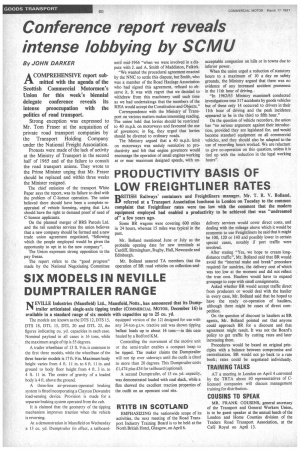Conference report reveals intense lobbying by SCMU
Page 62

If you've noticed an error in this article please click here to report it so we can fix it.
By JOHN DARKER ACOMPREHENSIVE report submitted with the agenda of the Scottish Commercial Motormen's Union for this week's biennial delegate conference reveals its intense preoccupation with the politics of road transport.
Strong exception was expressed to Mr. Tom Fraser at the acquisition of private road transport companies by the Transport Holding Company under the National Freight Association.
Protests were made of the lack of activity at the Ministry of Transport in the second half of 1965 and of the failure to consult the road transport unions. They wrote to the Prime Minister urging that Mr. Fraser should be replaced and within three weeks the Minister resigned.
The chief omission of the transport White Paper says the report, was its failure to deal with the problem of C-licence operation, The union believed there should have been a complete reappraisal of vehicle licensing, urging that LAs should have the right to demand proof of need of C-licence applicants.
On the planned merger of BRS Parcels Ltd. and the rail sundries services the union believes that a new company should be formed and anew trade union agreement negotiated, "following which the people employed would be given the opportunity to opt in to the new company".
The Union expresses strong opposition to the pay freeze.
The report refers to the "good progress" made by the National Negotiating Committee until mid-1966 "when we were involved in a dispute with J. and A. Smith of Maddiston, Falkirk.
"We wanted the procedural agreement enacted by the NNC to settle this dispute, but Smith, who was a member of the Road Haulage Association who had signed this agreement, refused to observe it. It was with regret that we decided to withdraw from this machinery until such time as we had undertakings that the members of the RHA would accept the Constitution and Objects."
Correspondence with the Ministry of Transport on various matters makes interesting reading. The union held that lorries should be restricted to 40 m.p.h. on motorways and favoured the use of governors; in fog, they urged that lorries should be diverted to ordinary roads.
The Ministry argued that a 40 m.p.h. limit on motorways was unduly restrictive to productivity and felt that engine governors would encourage the operation of small engines working at or near maximum designed speeds, with un acceptable congestion on hills or in towns due to inferior power.
When the union urged a reduction of statutory hours to a maximum of 10 a day on safety grounds, the Ministry argued that there was no evidence of any increased accident proneness in the 11th hour of driving. •
"In 1962/63 Ministry examined; conducted investigations into 317 accidents by goods vehicles but of these only 14 °cent red to drivers in their 11th hour of driving and the peak incidence appeared to be in the third to fifth hour."
On the question of vehicle recorders, the union has "no serious argument against their introduction. provided they are legislated for, and would become standard equipment on all commercial vehicles, and they should also be adapted to the use of recording hours worked. We are reluctant to give co-operation on this question, unless it is tied up with the reduction in the legal working hours".








































































































































































































